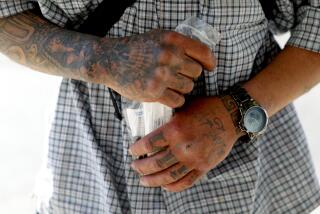Bill OKd to Cut Cost of Contact Lenses
- Share via
SACRAMENTO — Gov. Gray Davis signed a popular bill Monday aimed at reducing the cost of contact lenses by enabling about 4 million consumers to comparison-shop among the neighborhood pharmacy, Internet, mail-order houses and discount retailers.
The bill, which cleared both houses of the Legislature with only two no votes, will require that consumers be given a copy of their lens prescription by optometrists and ophthalmologists after an examination and fitting.
With the prescription, they then can search for the best prices, promoting competition among sellers and driving down prices, Davis said. Prices can range from a few dollars for common disposable lenses to $150 or more for specialty lenses for consumers with health problems.
The bill, AB 2020 by Assemblyman Lou Correa (D-Anaheim), was supported by the Center for Public Interest Law at San Diego, other consumer advocates and the California Optometric Assn. Edward Hernandez, the association’s president, said that more than two dozen states have enacted similar laws and that national legislation is pending in Congress.
Unlike eyeglasses, copies of prescriptions for contact lenses are not provided to patients in California. State Consumer Affairs Director Kathleen Hamilton termed release of the prescription “the ticket that enables consumers to shop wherever they want.”
Davis also signed one of the most important water bills of the year, SB 1653 by Sen. Jim Costa (D-Fresno). The bill creates a formal governing body for CalFed, a 7-year-old consortium of federal and state agencies working to protect the Sacramento-San Joaquin Delta as both a home for threatened fish and a major water source for Southern California.
For three years, lawmakers struggled to design a governing body for CalFed. The venture, with a 30-year plan, has spent about $1.5 billion of state funds.
The bill creates a California Bay-Delta Authority with representatives of six state agencies, six federal agencies and seven public members from various regions of the state.
Congress must enact a law allowing the federal agencies to participate in the new CalFed authority by 2006 or the state law will expire.
Davis also signed a bill by Sen. Martha Escutia (D-Whittier) that will expand a program offering discounted automobile insurance to low-income drivers. The bill changes the income threshold for eligibility so that tens of thousands more poor people will qualify.
The bill, SB 1427, which was sponsored by the Foundation for Taxpayer and Consumer Rights, will reduce the cost of the policy to $347 a year from $450 in Los Angeles and to $314 from $410 in San Francisco.
In other action Monday, Davis vetoed two bills:
* Veterans--AB 748 by Assemblyman Ed Chavez (D-La Puente) would have ordered the independent Bureau of State Audits to examine the effectiveness and finances of the troubled Cal-Vet farm and home loan program for veterans. Davis objected to requiring the Department of Veterans Affairs to pay for the bureau’s investigation and, instead, said he will order the department’s inspector general to do the audit.
Mexico--AB 552 by Assemblyman Marco Firebaugh (D-Los Angeles) would have created a committee to advise on state participation in Mexican projects aimed at reducing migration to California. Davis said immigration was an important question in California, but said the issue of development in foreign countries, even neighboring Mexico, “is a federal, not state, responsibility.”
*
Times staff writer Nancy Vogel contributed to this report.
More to Read
Get the L.A. Times Politics newsletter
Deeply reported insights into legislation, politics and policy from Sacramento, Washington and beyond. In your inbox twice per week.
You may occasionally receive promotional content from the Los Angeles Times.










